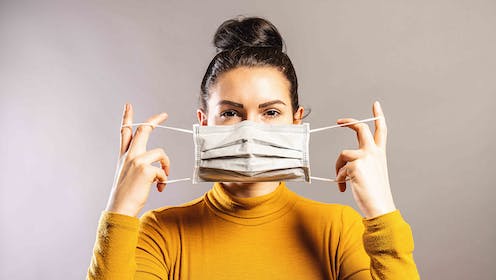
r.classen/Shutterstock
Almost three years into the pandemic, myths and misinformation remain widespread. Here we, a virologist and a public health researcher, debunk some common misconceptions about COVID.
Table of Contents
Myth 1: The virus is becoming milder
There’s a prevailing myth in the omicron era that SARS-CoV-2 (the virus that causes COVID-19) is becoming “milder”.
It’s true that earlier omicron variants (BA.1 and BA.2) were less likely than delta to cause severe illness, partly because they were more likely to infect the upper airway than the lower airway. This means omicron infections didn’t infect the lungs as aggressively as delta did.
But disease outcomes are critically dependent on immunity and the UK is privileged in this regard. When BA.2 hit Hong Kong in spring 2022, poorer vaccination coverage meant a devastating outbreak.
Even in England’s well-vaccinated population there have been almost 29,000 COVID deaths between January and early November 2022, and tens of thousands of hospitalisations.
Individual risk may have fallen, but high omicron infections and reinfections have considerable impact at population level. Subvariants continue to escape antibody immunity, and some (like BA.5) appear to have reacquired a preference for the lower airway. This, along with other factors, increased the risk of hospitalisation with BA.5 compared to BA.2.
So SARS-CoV-2 is not inherently mild, or necessarily becoming milder. We must also remember that millions of people can’t respond effectively to vaccines or are at heightened risk. Effective public health should combine updated vaccines against this moving target with limiting infections to slow viral evolution.
Read more:
I have COVID symptoms. Should I do a test?
Myth 2: COVID only affects older and vulnerable people
One common reason people don’t get vaccinated is perceiving a low personal risk from infection. Again, high prevalence inflates smaller individual risks. For younger people, even a mild infection can lead to long COVID, which affects up to one in five adults aged 18-64.
This myth is particularly problematic in relation to children. Kids are far less prone to severe COVID than adults, but among paediatric infectious diseases, COVID is a significant cause of death and illness. Children can also develop long COVID. Despite lacklustre UK government messaging, many healthcare agencies around the world recommend vaccinating kids against SARS-CoV-2.
Myth 3: Washing hands is enough to prevent COVID spread
SARS-CoV-2 spreads via tiny particles of moisture suspended in the air called aerosols. Droplets (for example from sneezing) and fomites (droplet-contaminated objects) play a role, but are not the major route of spread.
As such, ventilation and masks are key to reducing COVID transmission. But hand washing and sanitising have been more popular anti-COVID measures.
Some organisations were slow to accept airborne transmission. So messaging at the start of the pandemic, including from the UK government, over-emphasised the importance of hand washing.

Maridav/Shutterstock
A psychological phenomenon known as a “primacy effect” describes when people are more influenced by the first things they experience, and retain these concepts. It appears the early focus on droplets and fomites stuck in people’s minds, even once we knew SARS-CoV-2 was airborne.
Hand hygiene is important for reducing transmission of other diseases, but is not sufficient for airborne viruses.
Myth 4: Masks don’t work
Face masks work by protecting the wearer and others. But as with all mitigation strategies, this is never 100%. Masks work best alongside other measures and must be worn properly.
Masks range from cloth face coverings, to surgical masks, up to FFP2/N95 and FFP3/N99 respirators. Any barrier helps, but cloth masks mainly limit droplets and do little to protect the wearer from aerosols. Surgical masks with non-woven layers are significantly better, yet still offer limited protection compared with respirators.
Worn properly, FFP2 and FFP3 respirators filter 95% and 99% of particles respectively, down to the size of aerosols. In this way they protect the wearer and others.
Myth 5: Vaccines don’t reduce transmission
Delta caused noticeable breakthrough infections in people who had been vaccinated and reinfection is now common with omicron. This is due to the evolution of antibody-evasive mutations within SARS-CoV-2’s spike protein, along with natural antibody waning.
Research consistently supports that vaccination reduces omicron transmission as well as severity. Studies show that, while not eliminating the risk entirely, vaccinated people with breakthrough infections are less likely to spread the virus to others.

Gorodenkoff/Shutterstock
Myth 6: Vaccines were rushed through
COVID vaccine trials were not rushed. Remarkable cooperation, ample funding and innovative design accelerated things. But what’s usually the greatest bottleneck – patient recruitment – was bypassed by the sheer abundance of people exposed to SARS-CoV-2.
Vaccines saved an estimated 20 million lives globally in 2021. But as effective as they are, vaccines, like all medicines, are not perfect.
Up to October 2022, the UK’s Office for National Statistics recorded 56 deaths in England and Wales involving COVID vaccines. All these deaths are tragedies. Patient reporting systems like the Medicines and Healthcare products Regulatory Agency yellow card scheme show higher numbers before investigations.
Read more:
We measured vaccine confidence pre-pandemic and in 2022 – it’s declined considerably
When millions of people are vaccinated, serious and potentially fatal reactions do occur on rare occasions. This is partly due to our genetic diversity, but other factors also contribute.
Rare reactions include anaphylaxis (allergic responses to vaccine ingredients), blood clots and myocarditis and pericarditis (inflammation of the heart muscle or surrounding sac).
It became clear after millions of inoculations that the AstraZeneca vaccine could cause rare blood clots in the veins. Untreated, this can be fatal. These occur more in younger adults, but the UK now uses mainly mRNA vaccines.
Myocarditis after mRNA vaccination has caused concern, mainly in adolescent males, but is generally rare, mild, and gets better on its own. By contrast, myocarditis from a COVID infection is more common, long-lasting, and far more likely to require intensive care. In other words, the benefits of COVID vaccination clearly outweigh the risks.
![]()
Simon Nicholas Williams has received funding from Senedd Cymru, Public Health Wales and the Wales COVID-19 Evidence Centre for research on COVID-19. However, this article reflects the views of the author only and no funding bodies were involved in the writing or content of this article.
Stephen Griffin is affiliated with Independent SAGE.





























